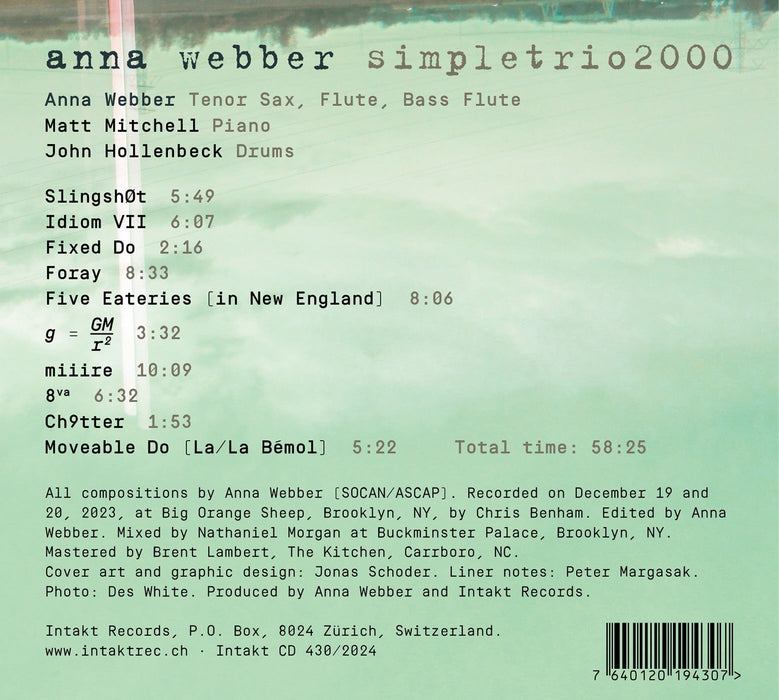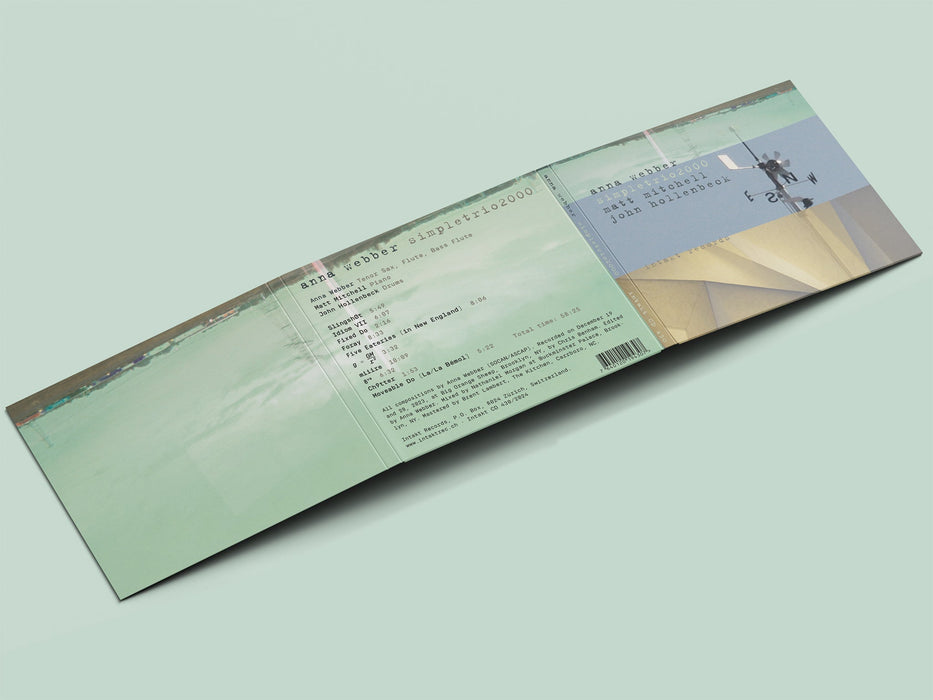





430: ANNA WEBBER with MATT MITCHELL and JOHN HOLLENBECK. simpletrio2000
Intakt Recording #430 / 2024
Anna Webber: Tenor Saxophone, Flute, Bass Flute
Matt Mitchell: Piano
John Hollenbeck: Drums
More Info
Jedes neue Album der Saxofonistin, Flötistin und Komponistin Anna Webber fühlt sich wie eine Offenbarung an und ist ein grosser Schritt vorwärts in einer Diskografie von höchster Qualität. Anna Webbers simpletrio2000 bringt - eine Dekade nach der Veröffentlichung des Debüts Simple - ihre tiefe Neugier und unermüdliche Kreativität zum Ausdruck. In der Überschneidung von Avantgarde-Jazz und neuer klassischer Musik wird ihr Schaffen als »visionär und fesselnd« gefei-ert. Mit ihren bisherigen Alben rangierte sie in den einschlägigen Bestenlisten regelmässig ganz oben. Das Simple Trio ist ihre am längsten bestehende Band. Seit der Gründung im Jahr 2013 haben nur wenige Bands in der improvisierten Musik eine solch sprudelnde Energie und einen solchen Abenteuergeist an den Tag gelegt wie das Simple Trio von Anna Webber. Die Gruppe, zu der auch Schlagzeuger John Hollenbeck und Pianist Matt Mitchell gehören - beide ebenfalls versierte Komponisten und Bandleader - macht Musik, die alles andere als ‹ simpel› ist. Doch die nicht zu überhörende Komplexität der Musik wird hier von einer stürmischen Fröhlichkeit begleitet, indes Peter Margasak von einer "durchgehend süchtig machenden Energie" im Zusammenspiel des Trio schwärmt.
Album Credits
Cover art and graphic design: Jonas Schoder
Liner notes: Peter Margasak
Photo: Des White
All compositions by Anna Webber (SOCAN/ASCAP). Recorded on December 19 and 20 at Big Orange Sheep, Brooklyn, NY, by Chris Benham. Edited by Anna Webber. Mixed by Nathaniel Morgan at Buckminster Palace, Brooklyn, NY. Mastered by Brent Lambert, The Kitchen, Carrboro, NC. Produced by Anna Webber and Intakt Records. P.O. Box, 8024 Zürich, Switzerland.
Each new album in the budding discography of Canadian saxophonist, flutist, and composer Anna Webber sounds like a step forward in the nebulous intersection between avant-garde jazz and new classical music. The wryly titled simpletrio2000 is the third album by Webber’s Simple Trio, following the group’s sophomore release Binary (Skirl, 2016), and debut, Simple (Skirl, 2014). Initially formed in 2013, Simple Trio is Webber’s longest-running band. The ensemble, which includes drummer John Hollenbeck and pianist Matt Mitchell – both veteran composers and bandleaders – performs Webber’s intricate compositions with an attention to detail that is anything but simple, although the complex music is often delivered with a buoyant flair.
Each Simple Trio release has explored different facets of composition. Although rhythmic complexity has long been part of Webber’s arsenal, for the band’s third effort, she focuses on polyrhythms. The pieces are built on jagged, start-stop rhythms and the repetition of elaborate contrapuntal lines that lend the proceedings a sense of tension and release, rather than discord. Webber’s multi-sectional compositions often assign two musicians to notated scores while allowing the third to improvise. Although much of the music is spirited, the album includes moments of restraint that counterbalance more frenetic passages. The ten tracks also include short solo pieces spotlighting each member, providing additional moments of introspection amid tightly woven group interplay: the intervallic lyricism of “Fixed Do” for tenor saxophone; the dramatically hastening piano chord progression “g=GM/r2” (the formula for determining acceleration due to gravity); and the resounding tuned drums feature “Ch9tter.”
“Slingsh0t” opens the recording with chiming refrains that progress into a terse harmonic sequence underpinned by brisk tempos in oscillating rhythmic patterns. “Idiom VII” advances polyrhythmic dalliances even further, evoking phrases played simultaneously backwards and forwards as tempos rush and falter with impressive accuracy; the flute-driven “Foray” exudes similar microtonal drama. “Five Eateries (In New England)” evokes a range of Ivesian textures in Mitchell’s plunging lines, Hollenback’s angular groove, and the leader’s warm tenor. The pointillist opening of “miiire” and the slow burn of “8va” provide temporary respite, while the final cut, “Movable Do (La-La Bémol)” is built on a cyclical motif underpinned by a labyrinthine clockwork groove, as Webber and Mitchell take turns alternating lead and support positions.
Throughout the program, Webber switches between tenor saxophone, flute, and bass flute, directing the mood with an array of tone colors and extended techniques. Mitchell’s staccato chording imbues the music with a shimmering percussive quality, while Hollenbeck’s precise, orchestral drumming provides a solid foundation, irrespective of meter. Together these three offer a continued inquiry into the limits of Creative Improvised Music, tempered by a subtle sense of humor. Marking a decade since the unit premiered, simpletrio2000 confirms the group as one whose distinctive approach boldly continues to push the music forward in an unforced and satisfying manner.
https://www.pointofdeparture.org/PoD90/PoD90MoreMoments4.html
Anna Webber's new album might be called simpletrio2000 but the only thing simple about this group relates to the ease in which they navigate the bandleader's complex ideas and original compositions. Along with Webber (tenor, flutes), the trio includes Matt Mitchell (piano) and John Hollenbeck (drums), a unit whose origins date back just over a decade and were heard most recently on half of Webber's double-disc 2021 release Idiom (the second disc features a large ensemble). Together they mesh with a precision that feels intuitive, anticipating solo and support role changes in the music, and playing stuttering passages with tight cohesion that occasionally creates the feel of a skip in the recording. Like much of Webber's work, simpletrio2000 dexterously walks the line between unhinged, unrestrained improvisation and modern composition.
"Idiom VII" starts with droplets of tenor notes, matched precisely by drums, rising and falling in dynamics before the trio really begins to gain momentum. Like the album, the music may sound a tad rigid, but certainly not stiff. Hollenbeck keeps it spiky by accenting a trippy beat. By the end, the saxophonist and pianist escape the gravitational pull of the tune's ostinato. "Fixed Do" makes the case that Webber could easily pull off a solo tenor album. Barely over two minutes, it features an inventive flow of ideas both lush and rough that could go on for much longer, instead of climaxing with some incredible octave leaps. "Five Eateries (In New England)" also features some rapid-fire playing in the opening minutes.
But it is on the selections where Webber switches to flute which offer some of the album's most electric and memorable moments. "Foray" begins with an ominous low-end piano figure that spurs both flute and drumming interplay to ecstatic heights. Along with "miiire" (on which bass flute is added), the trio seems to create their own new version of swing, where knotted-up clusters have an effortless facility. Mitchell and Hollenbeck, who also get brief solo pieces of their own, contribute mightily throughout, making the sound more expansive than one might expect from this bare-bones instrumentation. The pianist's combination of pedal point and delicate rolling chords provides a great foil to Webber's tenor overtones in "8va", and Mitchell's performance on "Moveable Do (La/La Bémol)" closes the album with sheer fire power.
The music might not be simple but it sure feels inviting.
Away from their academic roles, Canadian tenor saxophonist/flautist Anna Webber now at the New England Conservatory and American drummer John Hollenbeck who teaches at McGill, join long-time associate New York pianist Matt Mitchel, for a 10th anniversary reunion of their Simpletrio. The playing focus: 10 enigmatically titled Webber compositions.
Bookended by two modest groove tunes that expose their innate interaction as they blend reed honks, patterning and splattering keyboard stokes and metronomic drum beats, the exuberant mood they express animates the entire album. Although a track like 8va is languid enough to highlight Webber’s expressive bass flute lowing matched with intermittent piano clips, tough pressure and sophisticated linear melodies with mercurial timbral divergences characterize most of the other tunes.
“Idiom VII” for instance is built around a repeated unison riff, with interludes of reed tongue slapping, drum press rolls and carousing piano pumps. Meanwhile “Miiire” is a spidery tune that becomes speedier and more dissident as it unrolls without losing its horizontal flow. Prominent are Webber’s transverse flutters and peeps and Hollenbeck’s rim clanks, which at points unfold in tandem with the piano for more prominent sound coloration.
Countering the old saw that those who can do, and those who can’t teach, is this session involving Webber, who is Co-Chair of NEC’s Jazz Studies Department and Hollenbeck who has taught jazz drumming the McGill’s School of Music since 2015. Alongside Mitchell they prove they can definitely do.
https://www.jazzword.com/reviews/anna-webber-2/
Webber's music is as fun as it is difficult. It's worth it to wrap one's mind around this puzzling music, but one really has to be into puzzles. Pianist Matt Mitchell is well at home in this sound.
-Anthony Dean-Harris
If the staccato hiccups start to bewilder, the legato waves provide a cool curvature. Meaning the flow is both adventurous and amiable. Also meaning Webber's not only an intrepid composer, but a wise arranger as well.
-Jim Macnie
The writing here is absolutely brilliant, full of big ideas, sly rhythmic twists and ingenious slivers of melody. But the playing is even better: tight, intuitive and so deeply connected that the three sound sometimes like a single player, and sometimes like an entire orchestra. -
J.D. Considine
Classical rigor meets punk energy and cinematic noir in this latest record by the prolific composer, saxophonist and flutist Anna Webber's Simple Trio. Ten years in the making, Webber's sophomore effort is full of high-octane energy and genre-bending lines.
On simpletrio2000, Webber makes compositional concepts like polyrhythm, microtonality and perpetuum mobile feel accessible. "Slingshot” moves with the pulse of a heist film, anchored by a relentless driving dialogue between Webber's sax and Matt Mitchell's piano punctuated by dramatic staccato notes. "Idiom VII" has a sense of narrative woven into the jagged, angular lines of Webber's sax as it wrestles with the urgent, pulsating interplay between Mitchell's piano and drummer John Hollenbeck's backbeat. "miiire" sounds like a deconstructed "Flight of the Bumblebee," with Webber's throaty, effervescent flute locked in a dynamic call-and-response with Hollenbeck's persistent percussion.
"Foray" has an ominous feel to it that slowly builds in heat through Webber's mercurial trills on the flute. Meanwhile, "Five Eateries (in New England)" is a more balanced duet between Webber's saxophone and Mitchell's roving piano. These cinematic overtures are punctuated by three solo interludes, one for each member of the trio. "g=GM/r²" highlights Mitchell's muscular, dizzying piano while "Ch9tter” features Hollenbeck's disciplined-yet-kinetic percussion.
The album shows Webber to be a masterful and imaginative composer. She brings technical rigor to her arrangements, while giving the band wide berth to explore free-jazz lines, extended techniques and joyful exchanges.
Although the name of saxophonist and flautist Anna Webber's trio with pianist Matt Mitchell and drummer John Hollenbeck might suggest something easy to understand, there is nothing straightforward about their output. Notwithstanding the title, Simpletrio2000 constitutes the band's third release (or fourth if you include the first installment of the double discIdiom (Pi, 2021)), that arrives some ten years after the outfit's eponymous debut. Like much of Webber's work, the 11 cuts here are intricately plotted, even with only three instruments to track.
The Canadian reedist often uses an underlying idea as inspiration for her writing. As the liners reveal, here the generative tool was polyrhythms. But as the text also acknowledges, other factors may be equally if not more significant. And certainly rhythmic complexity has long been part of Webber's armory, as albums such as Clockwise (Pi, 2019)and Shimmer Wince (Intakt, 2023) attest. But such mischief holds no fears for collaborators as wily as Mitchell and Hollenbeck.
A dizzying talent, the pianist's own recordings often have reviewers scanning the Thesaurus for synonyms for "knotty." He proves just as capable of navigating the conundrums of others, spinning fiendish divergences from each hand in a bifurcated stream. Meanwhile, the drummer-composer is a master percussionist who likewise takes an orchestral approach, demarcating distinct strands through discrete elements of his kit. And whether nailing recurring figures to bolster the structural fabric or attacking unlikely tonalities, the leader achieves similarly astounding levels of precision.
Webber's robustly designed multi-sectioned constructs defy easy summary. She creates a volatile tapestry of lurching metrical layers which are not quite unisons but nor totally out of phase either. Nonetheless, blossoming among sharp-angled themes are moments of wayward feeling that undercut the cool abstract execution. For example, Webber's spiraling tenor saxophone bleats and skirls over the tumbling lock-step of "Idiom VII," then on "Foray" her flute oozes and flutters microtonally atop the foreboding drama, while Mitchell dazzles over the lightly etched staccato of "Slingsh0t."
Perhaps to offer the listener respite from such flighty machinations, Webber composed solo excursions for each player. She tends towards a sort of soured lyricism on the raw-boned tenor soliloquy of "Fixed Do." Hollenbeck demonstrates his exceptional control on the tuned and attenuated clatter of "Ch9tter," while Mitchell's feature "g equals GM over r squared" confounds by presenting the opposite of what you might anticipate from him, unfolding via a series of sustained pregnant chords with ringing overtones, at least to begin with before the inevitable digressions.
By this stage the threesome's chemistry is so ultra-refined that they make the realization of Webber's singular conception not only sound unforced, but more importantly, eminently satisfying.
https://www.allaboutjazz.com/simpletrio2000-anna-webber-intakt-records
Libero Farnè's Best Jazz Albums Of 2024
https://www.allaboutjazz.com/libero-farne-best-jazz-albums-of-2024
Here is the background courtesy of the press release: saxophonist, flautist, and Canadian composer Anna Webber—a meticulous conceptualist in improvised music—draws from the depths of polyrhythmic inspiration for her latest album, “Simpletrio2000”. Over the past decade, Webber has earned well-deserved acclaim for her rhythmic inventiveness and distinct stylistic twists across several albums. This new release marks ten years since the debut of her long-running band Simple Trio, featuring pianist Matt Mitchell and drummer John Hollenbeck.”
The album gets off to a great start with ‘Slingshot’ which opens with a few saxophone parps, explorative piano runs, the sax repeating the motif, a serpentine- like sax solo underpinned by solid rock drumming. ‘Idiom VII’ is more of an innovatory piece, similarly introduced in a kind of rhythmic study not so easy on the ear but incontrovertibly fascinating. ‘Fixed Do’ is a solo piece for sax. Sax is exchanged for flute on ‘Foray’, over eight minutes long, an ominous mood created by Mitchell’s minor piano chords, notes and tinkles, with Hollenbeck largely confined to tom-toms, bass drum and cymbals; Anna Weber’s dexterity on the woodwind is breathtaking, playing with a Roland Kirk intensity, a stop-start sequence leading to a complex, twisting and turning denouement inducing a feeling of film noir; definitely a stand-out for me. Back on sax for ‘Five Eateries (In New England)’ (another eight-minute piece) in an alternative jazz rock fusion mould, the three musicians sound as if they are playing different variations on a theme in an ingenious melange, the sax alternately fluttering like a butterfly and howling at the wind in the changing mood, Mitchell hitting the low notes of his piano in response, a poignant jazz melody leading to a tangled denouement. There’s a piano solo piece before longest number ‘Miiire’, subtle flute intermingling with odd piano chords and repeated notes, brushes of the drums, distinctly fugue-like, becoming increasingly animated then stalling in a myriad of reverberated piano and flurries of flute, Hollenbeck’s dexterity given some moments in the spotlight late on; an uncompromising but intriguing piece.
After the storm comes the calm: ‘8va’ on which the introductory sax shrinks to a whisper, sparse piano chords and the occasional note creating an ambient soundscape that provides a quiet zone after the labyrinthine excursions that have proceeded it, another ‘go to’ piece. The drummer’s brief spotlight solo track that comes next is refreshingly unconventional. It continues into final number ‘Moveable Do’, more quixotic moves, on which the pianist excels, unleashing his own inventive solos alongside the saxophonist’s, a piece that will appeal to all spectra of jazz lovers, and another recommended starting point if sampling; all-in-all, an inventive and intriguing album of contemporary and experimental jazz laced with ‘tales’ of mystery and imagination.
https://www.Dimensions in Sound and Space.com/post/anna-webber-with-matt-mitchell-and-john-hollenbeck-simpletrio2000-intakt-records-2024
Bei simpletrio2000 (Intakt CD 430) ist ANNA WEBBER einmal mehr mit ihrem seit 2013 bestehenden Trio mit MATT MITCHELL am Piano und JOHN HOLLENBECK an Drums zu hören. Mit „Clockwise", zu siebt auf Pi Recordings, und „Shimmer Wince", in einem ebenfalls bei Intakt präsentierten Quintett, hat die kanadische Tenorsaxophonistin und Flötistin in New York zwar auch schon weitergehende Ambitionen durchklingen lassen. Aber die Vertrauensbasis im Simple Trio gibt ihr alle Möglichkeiten für polyrhythmische Raffinessen, Slap Tonguing, Mikrotonalität. Selbst die, mit 'g=GM/r2', der Formel der Fallbeschleu-nigung, den existenziellen freien Fall wie Musik klingen zu lassen. Sie mit Jg. Orwell und Katzeninstinkt, Mitchell mit Jg. 1975 und dem Knowhow von Thinking Plague bis Jon Irabagon's Outright!, und Hollenbeck, Jg. 1968, mit der Erfahrung als Leader von The Claudia Quintet und der großen Spannweite von Tony Malaby oder Junk Box bis Theo Bleckmann und Meredith Monk. Dass selbst Heufuß-Strohfuß-Groove, schön hartnäckig gedrehte Kringel und gewitzte Formeln im bildungsbürgerlichen Selbstverständnis, für das Jazz so distinktiv war wie Abstrakter Expressionismus oder Magischer Realismus, auf der Streichliste steht gruselig. Die kollektive Versimplelung kann zunehmend mit dem, was kreativ und sinnesfroh sprudelnd, mit Flötentirili, launigem Staccato, seine Zweifel und Selbstzweifel abschüttelnd oder in akzelerierendem LaLa Bémol als Brandmauer gegen Hass und Herdentrieb steht, nichts mehr anfangen? O heilige Einfalt!
Secondo disco, dopo il debutto di 10 anni fa, per il trio della sassofonista e flautista canadese con Matt Mitchell al piano e John Hollenbeck alla batteria.
Composizioni tese e scattanti come centometristi giamaicani, triangoli scaleni dove le forme mutano, si aprono, si sfaldano per poi ricomporsi seguendo geometrie avvincenti, articolate, mai prevedibili. La scrittura è serrata, non lascia tregua e i pezzi pigliano al collo per non mollarti fino alla fine con invenzioni, agguati, scarti a destra e fughe a sinistra. Alcuni frangenti potrebbero fare la gioia dei metallari evoluti che amano band come i Meshuggah. Per chi se li ricorda, a me hanno fatto venire in mente i Fieldwork di Lehman, lyer e Sorey. Una botta di ottime vitamine, ennesima conferma di un'etichetta che gode di salute eccellente.
